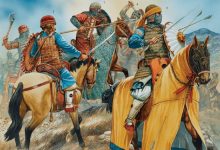The Battle of Malandarai Pass (1586): A Significant Clash in the Mughal Conquest of Northern India
The Battle of Malandarai Pass, fought in 1586, marks a pivotal moment in the complex history of the Mughal Empire’s expansion into Northern India. This battle, set against the rugged backdrop of the Malandarai Pass in present-day Pakistan, was a crucial engagement between the Mughal forces and the Swat Yusufzai Tribes, ultimately leading to a significant setback for the Mughal Empire.
Context and Background of the Battle
In the late 16th century, the Mughal Empire, under Emperor Akbar, was deeply involved in expanding its influence and territory across Northern India and beyond. The Mughal strategy involved consolidating power in regions such as Kabul, Swat, Peshawar, and other parts of modern-day Pakistan. These regions, however, were not without resistance. The Swat Yusufzai Tribes, known for their fierce independence and resistance to external domination, had long posed a challenge to Mughal control in the area.
The strategic significance of the Malandarai Pass lay in its location: it served as a critical route connecting various regions of the Mughal Empire to the northern territories. Control over this pass was vital for both military and trade reasons, and the Mughal Empire sought to dominate the area to secure its hold on the region. However, the Swat Yusufzai Tribes, who had a deep-rooted presence in the region, would not easily relinquish control.
The battle of Malandarai Pass in 1586 was thus not merely a confrontation over land but a clash of cultures, ideologies, and political aspirations. The Mughal forces, led by representatives of the empire’s military elite, faced off against a tribal coalition composed of the Swat Yusufzai Tribes, supported by local forces from Kabul, Swat, and Peshawar. The tribes’ determination to defend their homeland was in stark contrast to the Mughal desire to extend their imperial reach.
The Participants in the Battle
Several key participants played significant roles in the battle. On the Mughal side, the forces were comprised of soldiers from the imperial army, which included cavalry and infantry units. The Mughal forces were commanded by high-ranking officials loyal to Emperor Akbar, though specific names of the commanders involved remain largely undocumented.
The opposing forces were a coalition of local tribal leaders, with the Swat Yusufzai Tribes at the forefront. These tribes were known for their warrior culture and their ability to resist foreign invaders. They had a strong network of alliances with neighboring tribes and were adept at guerrilla warfare tactics, which would prove decisive in the battle. The involvement of local forces from Kabul and Peshawar also played a crucial role in the strength of the tribal resistance.
The Swat Yusufzai Tribes were led by influential leaders within their community, though again, historical records offer little in terms of specific names. The tribes’ united front against the Mughals showcased their resolve to preserve their independence and autonomy in the face of foreign imperial expansion.
The Course of the Battle
The battle itself took place in the rugged terrain of the Malandarai Pass, which proved to be an ideal setting for the tribal forces, familiar with the landscape, to launch effective ambushes and surprise attacks. The Mughal forces, despite their superior numbers and equipment, found themselves at a disadvantage due to their lack of local knowledge and the tribes’ expertise in utilizing the terrain to their advantage.
The Swat Yusufzai Tribes, utilizing guerrilla tactics and deep knowledge of the pass’s geography, were able to launch devastating strikes against the Mughal forces. The Mughals, accustomed to open-field warfare and large-scale battles, struggled to adapt to the narrow, treacherous environment of the pass. Their inability to effectively manage the local terrain, compounded by logistical challenges, played a crucial role in their defeat.
As the battle raged on, the Mughal forces, unable to maintain their ground, were forced to retreat. The Swat Yusufzai Tribes emerged victorious, decisively halting the Mughal advance through the pass. This victory had a significant impact on the Mughal Empire’s efforts to expand further into the northern regions.
Aftermath and Impact
The aftermath of the battle saw the Mughal Empire reassess its strategy in the region. The loss at Malandarai Pass marked a setback for Emperor Akbar’s ambitious military campaigns in northern India, especially in the territories that would later be crucial in consolidating Mughal power. Although the Mughals were able to recover from this defeat and eventually regain control over parts of the northern frontier, the battle demonstrated the resilience of local tribal forces and the difficulty the Mughal Empire faced in fully subduing the region.
For the Swat Yusufzai Tribes, the victory at Malandarai Pass solidified their reputation as formidable opponents of imperial rule. Their ability to withstand the Mughal onslaught was a testament to their military prowess and the deeply rooted sense of autonomy within their tribal structure. The success in this battle did not, however, signal the end of Mughal ambitions in the region. The Mughals would continue their efforts to bring the northern territories under their control, although the Swat Yusufzai Tribes and other local forces would remain significant challenges to their authority.
Conclusion
The Battle of Malandarai Pass in 1586 was a defining moment in the history of the Mughal Empire’s military campaigns in northern India. It showcased the resilience and resourcefulness of the Swat Yusufzai Tribes in defending their homeland against the expansionist ambitions of one of the most powerful empires of the time. The defeat of the Mughal forces at Malandarai Pass also highlighted the difficulties faced by imperial powers in subjugating local populations, particularly those with strong regional identities and military capabilities.
In the broader context of the Mughal Conquest of Northern India, this battle represents one of many instances of local resistance that shaped the course of Indian history. While the Mughals eventually regained control of much of the region, the Battle of Malandarai Pass remains a symbol of the enduring spirit of resistance against imperial domination.

